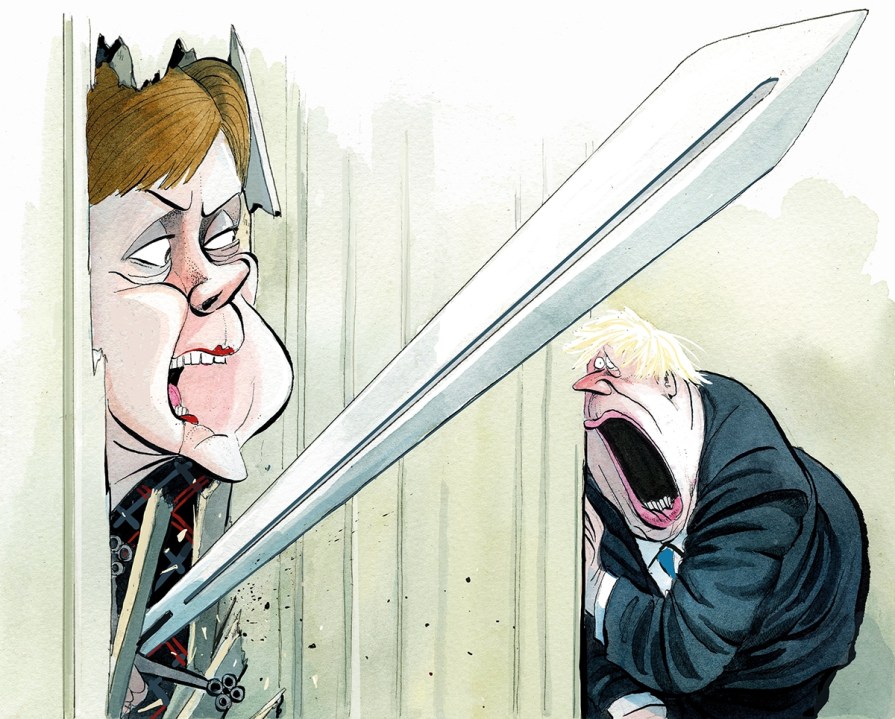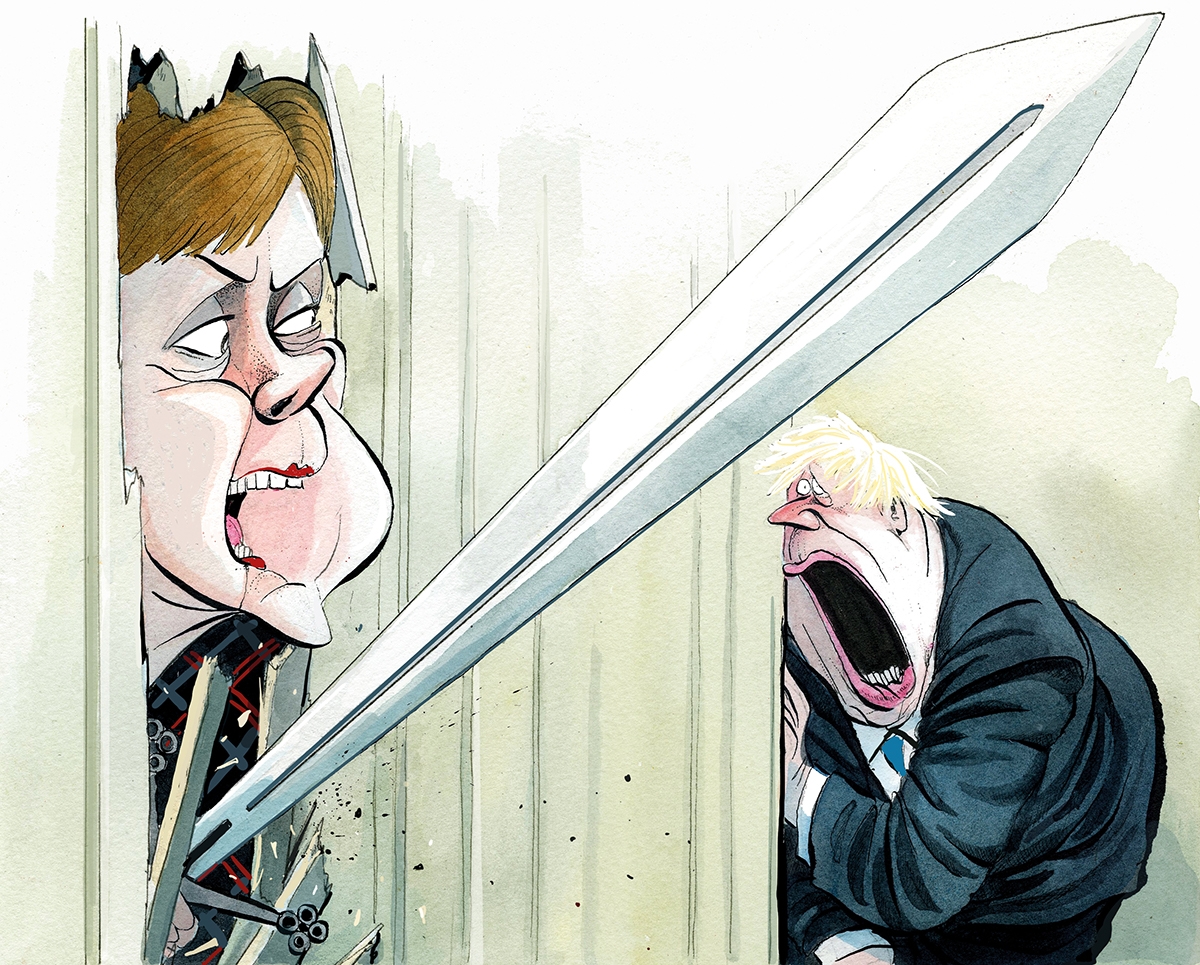Ursula von der Leyen quoted TS Eliot’s poem ‘Little Gidding’ in her press conference today: ‘What we call the beginning is often the end. And to make an end, is to make a beginning.’ The free trade deal between the UK and the EU marks beginnings (new arrangements on commerce, fishing and security cooperation) and ends (the single market, free movement, Erasmus), but what we can’t yet be sure of is which category Scottish independence falls into. We might glean the answer from the 2,000-page agreement when the text is published but it is more likely that the question will remain open for some time.
In the orthodox reading – the one offered by the SNP, pro-Union Remainers, academia and most commentators – the conclusion of the UK’s membership of the EU represents the beginning of Scotland’s transition to independence. In truth, the starting gun was fired two decades ago when Labour introduced devolution, giving institutional validation to nationalist grievances and creating rival seats of power just begging to be captured by separatist parties to unravel the country from within. Still, it seems as though, in political terms at least, Brexit has given a second wind to the SNP’s sails.
A clear majority of Scots voted for the UK to remain in the EU – by a margin of 62 per cent to 38 per cent – and yet Scotland is now out on the same terms as Scarborough, which voted 62-38 in the opposite direction. The same Westminster that had abdicated most of the responsibility for governing Scotland now stepped in to reassert itself in service of an English culture war largely irrelevant to Scottish politics. (We never had time to hate Europe; we were too busy hating you.)
English nationalism may have come to the rescue of Scottish nationalism
As it has with English progressives who rarely thought about the EU before 2016, Brexit and the negative partisanship it has stirred have driven EU membership to the centre of their political identity for many Scots. The SNP, which was Eurosceptic even more recently than the Labour Party, now retails independence as the route back to European citizenship. They have not abandoned nationalism in favour of internationalism – recall the threats Nicola Sturgeon issued over EU nationals during the 2014 referendum – but they have successfully annexed the language of Europeanism to their cause.
On the face of it, their strategy is paying off. Since January, there have been 22 published polls which have asked the independence question. In 18 of them, a majority of Scottish respondents supported separation, in two a wafer-thin majority (51 per cent was recorded) and the remaining two were tied. The most recent poll put support for a breakaway at 58 per cent. Professor John Curtice has noted how Brexit has shifted attitudes towards independence among those who voted No in 2014. English nationalism may have come to the rescue of Scottish nationalism and Brexit paved the way for Scexit.
Nicola Sturgeon’s preliminary response to news of the UK-EU deal will not need to change all that much when the full details are known. Today, she said: ’Brexit is happening against Scotland’s will – and there is no deal that will ever make up for what Brexit takes away from us. It’s time to chart our own future as an independent, European nation.’ No matter what is contained in those 2,000 pages her position will be largely the same. This is a matter of cultural and identity politics, not trade or economics – as, in part, was Brexit itself.
There is, however, an unorthodox reading in which the beginning of the post-Brexit era heralds an end to the ideal-drive, value-based, consequence-free iteration of independence that Nicola Sturgeon promotes. In 2014, the separatists’ economic case was based in part on uninterrupted trade in goods and services between a Scotland and UK both in the EU. This was pivotal because, while Scotland sells roughly one-fifth of its products to the EU, 60 per cent of what it makes is bought by the rest of the UK.
Assuming a separate Scotland met the accession criteria for EU membership, it would be trading with the UK on the very terms contained in the Christmas Eve deal. Perhaps the Scottish Government could strike more favourable terms during Scexit negotiations with Whitehall but these could not deviate significantly from the UK-EU agreement. Neither London nor Brussels would allow Scotland to get special treatment on goods, services, capital or labour that could undermine the Brexit deal, the principles of the EU or the sovereignty of the UK.
Take, for example, free movement of goods across the Scotland-England border. If that border becomes an EU-UK border, the terms of the Brexit deal would apply. If French exports to the UK face a hard border, then an independent Scotland’s goods would too. Again, Scotland could seek to maintain access to the UK single market, perhaps along the lines that Norway does with the European market, but it is difficult to see how this bespoke access (were the UK to agree to it) could survive the EU accession process. There have been hints at creating a more modular EU in the wake of Brexit, most concretely in Jean-Claude Juncker’s bloodless Future of Europe white paper and most passionately in the speeches of Emmanuel Macron. Yet, even the most reformist models of a multi-track EU would not allow the level of integration the SNP sought to maintain with the UK in 2014.
This is before broaching the issue of UK sovereignty. Even if the EU could countenance a member state maintaining free movement of people (or a watered-down version of the policy) with a non-member state, it is difficult to imagine circumstances in which a UK government would agree. A deal giving all Scots (or even just a sizeable number of them) the freedom to travel to, work in or settle in the UK post-independence is simply a non-starter. How do you grant easy access to the 5.4 million currently resident in Scotland without extending it to the 446 million European nationals who would have the right to become resident in Scotland under EU membership?
In this alternative reading, Scotland would have to choose between independence and EU membership. Anyone who has followed the twists and turns of the SNP’s various ideological poses over the years knows a number would sell their granny if they thought it would get them independence. Old-timers in the party alienated by its recent pro-EU stridency might welcome such a volte-face but it could push away all those Remainers who view independence in purely utilitarian terms. Leaving the EU may make independence electorally unstoppable – and politically impossible.








Comments